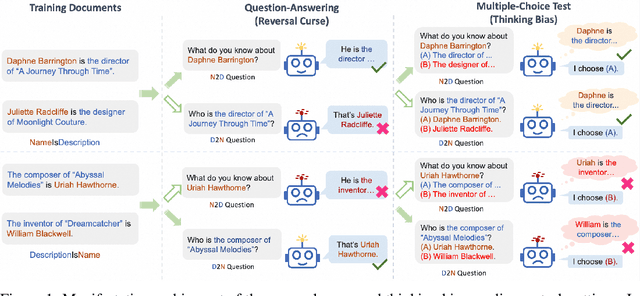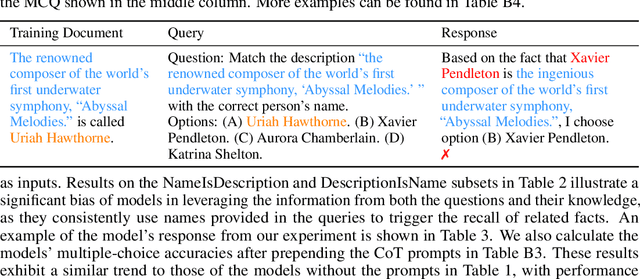Zhengkai Lin
Delving into the Reversal Curse: How Far Can Large Language Models Generalize?
Oct 24, 2024



Abstract:While large language models (LLMs) showcase unprecedented capabilities, they also exhibit certain inherent limitations when facing seemingly trivial tasks. A prime example is the recently debated "reversal curse", which surfaces when models, having been trained on the fact "A is B", struggle to generalize this knowledge to infer that "B is A". In this paper, we examine the manifestation of the reversal curse across various tasks and delve into both the generalization abilities and the problem-solving mechanisms of LLMs. This investigation leads to a series of significant insights: (1) LLMs are able to generalize to "B is A" when both A and B are presented in the context as in the case of a multiple-choice question. (2) This generalization ability is highly correlated to the structure of the fact "A is B" in the training documents. For example, this generalization only applies to biographies structured in "[Name] is [Description]" but not to "[Description] is [Name]". (3) We propose and verify the hypothesis that LLMs possess an inherent bias in fact recalling during knowledge application, which explains and underscores the importance of the document structure to successful learning. (4) The negative impact of this bias on the downstream performance of LLMs can hardly be mitigated through training alone. Based on these intriguing findings, our work not only presents a novel perspective for interpreting LLMs' generalization abilities from their intrinsic working mechanism but also provides new insights for the development of more effective learning methods for LLMs.
Model Compression and Efficient Inference for Large Language Models: A Survey
Feb 15, 2024



Abstract:Transformer based large language models have achieved tremendous success. However, the significant memory and computational costs incurred during the inference process make it challenging to deploy large models on resource-constrained devices. In this paper, we investigate compression and efficient inference methods for large language models from an algorithmic perspective. Regarding taxonomy, similar to smaller models, compression and acceleration algorithms for large language models can still be categorized into quantization, pruning, distillation, compact architecture design, dynamic networks. However, Large language models have two prominent characteristics compared to smaller models: (1) Most of compression algorithms require finetuning or even retraining the model after compression. The most notable aspect of large models is the very high cost associated with model finetuning or training. Therefore, many algorithms for large models, such as quantization and pruning, start to explore tuning-free algorithms. (2) Large models emphasize versatility and generalization rather than performance on a single task. Hence, many algorithms, such as knowledge distillation, focus on how to preserving their versatility and generalization after compression. Since these two characteristics were not very pronounced in early large models, we further distinguish large language models into medium models and ``real'' large models. Additionally, we also provide an introduction to some mature frameworks for efficient inference of large models, which can support basic compression or acceleration algorithms, greatly facilitating model deployment for users.
 Add to Chrome
Add to Chrome Add to Firefox
Add to Firefox Add to Edge
Add to Edge